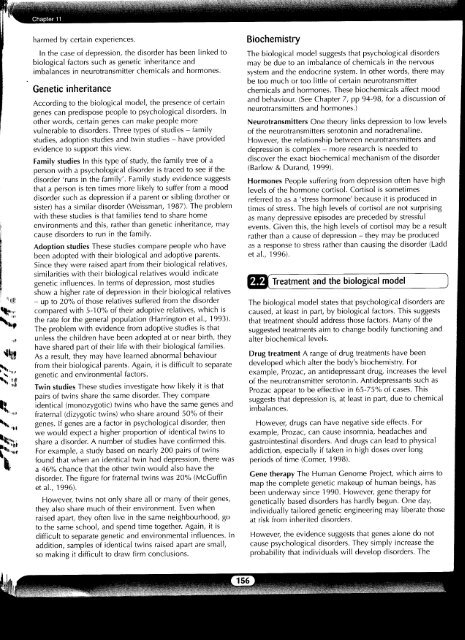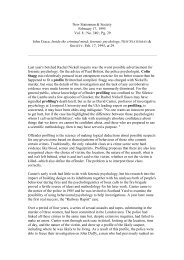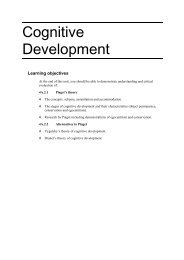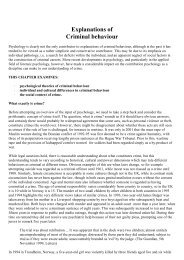Ch 11 - Jeff Standen
Ch 11 - Jeff Standen
Ch 11 - Jeff Standen
You also want an ePaper? Increase the reach of your titles
YUMPU automatically turns print PDFs into web optimized ePapers that Google loves.
harmed by certain experiences.<br />
In the case of depression, the disorder has been linked to<br />
biological factors such as genetic inheritance and<br />
imbalances in neurotransmitter chemicals and hormones.<br />
Genetic inheritance<br />
According to the biological model, the presence of certain<br />
genes can predispose people to psychological disorders. In<br />
other words, certain genes can make people more<br />
vulnerable to disorders. Three types of studies - family<br />
studies, adoption studies and twin studies - have provided<br />
evidence to support this view.<br />
Family studies In this type of study, the family tree of a<br />
person with a psychological disorder is traced to see if the<br />
disorder 'runs in the family'. Family study evidence suggests<br />
that a person is ten times more likely to suffer from a mood<br />
disorder such as depression if a parent or sibling (brother or<br />
sister) has a similar disorder (Weissman, 1987). The problem<br />
with these studies is that families tend to share home<br />
environments and this, rather than genetic inheritance, may<br />
cause disorders to run in the family.<br />
Adoption studies These studies compare people who have<br />
been adopted with their biological and adoptive parents.<br />
Since they were raised apart from their biological relatives,<br />
similarities with their biological relatives would indicate<br />
genetic influences. In terms of depression, most studies<br />
show a higher rate of depression in their biological relatives<br />
- up to 20% of those relatives suffered from the disorder<br />
compared with 5-10% of their adoptive relatives, which is<br />
the rate for the general population (Harrington et al., 1993).<br />
The problem with evidence from adoptive studies is that<br />
unless the children have been adopted at or near birth, they<br />
have shared part of their life with their biological families.<br />
As a result, they may have learned abnormal behaviour<br />
from their biological parents. Again, it is difficult to separate<br />
genetic and environmental factors.<br />
Twin studies These studies investigate how likely it is that<br />
pairs of twins share the same disorder. They compare<br />
identical (monozygotic) twins who have the same genes and<br />
fraternal (dizygotic twins) who share around 50% of their<br />
genes. If genes are a factor in psychological disorder, then<br />
we would expect a higher proportion of identical twins to<br />
share a disorder. A number of studies have confirmed this.<br />
For example, a study based on nearly 200 pairs of twins<br />
found that when an identical twin had depression, there was<br />
a 46% chance that the other twin would also have the<br />
disorder. The figure for fraternal twins was 20% (McGuffin<br />
et al., 1996).<br />
However, twins not only share all or many of their genes,<br />
they also share much of their environment. Even when<br />
raised apart, they often live in the same neighbourhood, go<br />
to the same school, and spend time together. Again, it is<br />
difficult to separate genetic and environmental influences. In<br />
addition, samples of identical twins raised apart are small,<br />
so making it difficult to draw firm conclusions.<br />
Biochemistry<br />
The biological model suggests that psychological disorders<br />
may be due to an imbalance of chemicals in the nervous<br />
system and the endocrine system. In other words, there may<br />
be too much or too little of certain neurotransmitter<br />
chemicals and hormones. These biochemicals affect mood<br />
and behaviour. (See <strong>Ch</strong>apter 7, pp 94-98, for a discussion of<br />
neurotransmitters and hormones.)<br />
Neurotransmitters One theory links depression to low levels<br />
of the neurotransmitters serotonin and noradrenaline.<br />
However, the relationship between neurotransmitters and<br />
depression is complex - more research is needed to<br />
discover the exact biochemical mechanism of the disorder<br />
(Barlow & Durand, 1999).<br />
Hormones People suffering from depression often have high<br />
levels of the hormone Cortisol. Cortisol is sometimes<br />
referred to as a 'stress hormone' because it is produced in<br />
times of stress. The high levels of Cortisol are not surprising<br />
as many depressive episodes are preceded by stressful<br />
events. Given this, the high levels of Cortisol may be a result<br />
rather than a cause of depression - they may be produced<br />
as a response to stress rather than causing the disorder (Ladd<br />
et al., 1996).<br />
Treatment and the biological model<br />
The biological model states that psychological disorders are<br />
caused, at least in part, by biological factors. This suggests<br />
that treatment should address those factors. Many of the<br />
suggested treatments aim to change bodily functioning and<br />
alter biochemical levels.<br />
Drug treatment A range of drug treatments have been<br />
developed which alter the body's biochemistry. For<br />
example, Prozac, an antidepressant drug, increases the level<br />
of the neurotransmitter serotonin. Antidepressants such as<br />
Prozac appear to be effective in 65-75% of cases. This<br />
suggests that depression is, at least in part, due to chemical<br />
imbalances.<br />
However, drugs can have negative side effects. For<br />
example, Prozac, can cause insomnia, headaches and<br />
gastrointestinal disorders. And drugs can lead to physical<br />
addiction, especially if taken in high doses over long<br />
periods of time (Comer, 1998).<br />
Gene therapy The Human Genome Project, which aims to<br />
map the complete genetic makeup of human beings, has<br />
been underway since 1990. However, gene therapy for<br />
genetically based disorders has hardly begun. One day,<br />
individually tailored genetic engineering may liberate those<br />
at risk from inherited disorders.<br />
However, the evidence suggests that genes alone do not<br />
cause psychological disorders. They simply increase the<br />
probability that individuals will develop disorders. The







